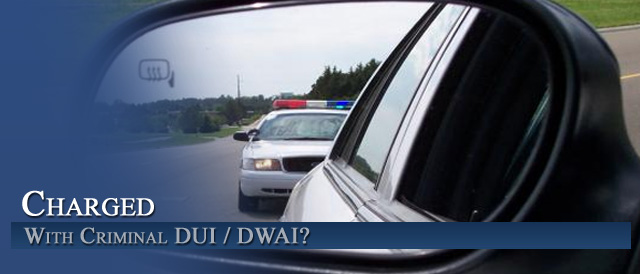


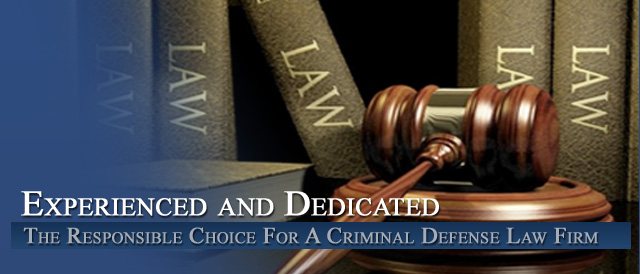
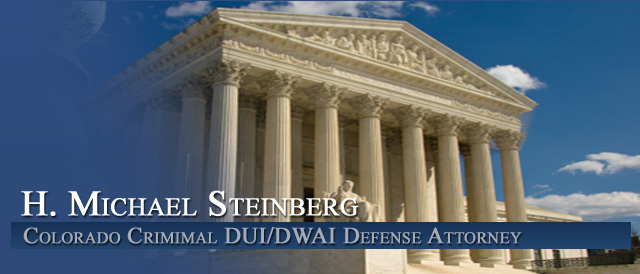
Colorado Criminal Law – Pretext Searches – The Emergency / Community Caretaking Exception To The Fourth Amendment
By H. Michael Steinberg Colorado DUI Criminal Defense Lawyer
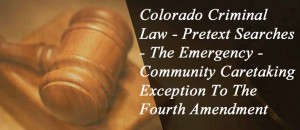 Colorado Criminal Law – Pretext Searches – The Emergency / Community Caretaking Exception To The Fourth Amendment – The police are permitted under some circumstances to side step the 4th Amendment’s requirement of a search warrant. One way is the use of an exception to the requirement of a warrant called the “emergency exception” – sometimes called the “community caretaking” exception.
Colorado Criminal Law – Pretext Searches – The Emergency / Community Caretaking Exception To The Fourth Amendment – The police are permitted under some circumstances to side step the 4th Amendment’s requirement of a search warrant. One way is the use of an exception to the requirement of a warrant called the “emergency exception” – sometimes called the “community caretaking” exception.
Understanding The Fourth Amendment
The Fourth Amendment guarantees individuals the right to be free from unreasonable searches and seizures. That means – in it’s simplest form – that the government may not search people or their property without a warrant which is supported by probable cause.
A person’s home is that place in which the individual has their strongest Fourth Amendment protections. In the year 1759, more than thirty years before the Fourth Amendment was proposed, Richard Jackson said:
“Those who would give up essential Liberty, to purchase a little temporary Safety, deserve neither Liberty nor Safety.”
A search of a person, a person’s home, a person’s vehicle and property is per se unreasonable under the Fourth Amendment if the search is not conducted pursuant to a search warrant.
A “search warrant” is a written order signed by a judge that permits a law enforcement officer to search a particular person, place, or thing.
An “exception” to the Warrant Requirement of the 4th Amendment means a search warrant is not required. Examples of exceptions to the warrant requirement recognized by the United States Supreme Court are
- plain view,
- exigent circumstances,
- hot pursuit,
- search incident to a lawful arrest,
- consent to search,
- border search, and
- stop and frisks.
Under the exigent circumstances exception is a subcategory which is called the “emergency” or “community caretaker” exception to the warrant requirement.
The emergency exception to the Warrant Requirement recognizes that police function as community caretakers in addition to their roles as criminal investigators and law enforcers.
This emergency exception has three basic requirements:
(1) The police must have reasonable grounds to believe that there is an emergency at hand and an immediate need for their assistance for the protection of life or property;
(2) The search must not be primarily motivated by an intent to arrest and/or to seize evidence; and
(3) There must be some reasonable basis, approximating probable cause, to associate the emergency with the area or place to be searched.
A Closer Look At The “Emergency Exception” to the Fourth Amendment
As noted above, the Fourth Amendment to the United States Constitution and article II, section 7 of the Colorado Constitution, prohibit unreasonable searches and seizures. A warrantless search and seizure is unconstitutional unless it falls under a well-delineated, specifically established exception to the Warrant Clause of the Fourth Amendment.
One exception to the Warrant Clause is the exigent circumstances exception which, by definition, necessitates immediate police action.
Recap
Traditional exigent circumstances doctrinal law recognizes three basic exigencies which require immediate police action. These are:
(1) the bona fide “hot pursuit” of a fleeing suspect;
(2) the risk of the immediate destruction of evidence; and
(3) a colorable claim of an emergency that threatens the life or safety of another.
The third emergency exception further requires:
(1) an immediate crisis; and
(2) the probability that assistance will be helpful.
A Court tasked to determine whether the State has proven that a presumptively invalid warrantless entry is justified by the emergency exception, is mandated to examine the totality of the circumstances surrounding a claim by law enforcement that a warrant was not necessary under the emergency exception.
Understanding The Tasks And Responsibilities Of Law Enforcement
American Bar Association has described the role of the police as having:
“complex and multiple tasks to perform in addition to identifying and apprehending persons committing serious criminal offenses,” including to “aid individuals who are in danger of physical harm,” “assist those who cannot care for themselves,” and “provide other services on an emergency basis”
This “community caretaking” function is completely separate from the traditional view of the police – the detection, investigation, or acquisition of evidence relating to violation of a criminal law. Under the “community caretaking doctrine,”the police are permitted, without reasonable suspicion of any criminal activity, to approach and detain citizens solely for community caretaking purposes and the “the normal probable cause standard and warrant requirement need not be satisfied before their caretaking functions commence.”
The “emergency aid” exception, is sometimes confused with the “exigent circumstances” exception to the warrant clause of the 4th Amendment. At it’s most fundamental level, the emergency aid exception:
…focuses on the protection of people, whereas the exigent circumstances exception focuses on the protection of evidence.
The problem is not with the community caretaking function itself – it is when that function is used as a PRETEXT to conduct an illegal search.
An Example: In a Wisconsin case, the police, investigating a DUI related car accident, track the driver to a home in the suburbs where he lives with his brother. The brother lets them into the house and directs them to the suspect’s bedroom where the suspect refuses the police entry. The brother, at the request of the police, open the door to the bedroom. The Defendant is charged with DUI.
The Wisconsin Supreme Court held that the search was legal under the officer’s community caretaker function and that the officer’s “the officer’s subjective intent (the real reason they broke into the Defendant’s bedroom) does not invalidate an otherwise reasonable exercise of the community caretaker function.”
“Under the totality of the circumstances, the community caretaker exception to the warrant requirement resulted in permissible police conduct,” the Wisconsin high court wrote. “The community caretaker function was reasonably exercised by the police officers because the public interest in the search outweighed Gracia’s privacy interests.”
Welfare Checks As An Exception To The Warrant Requirement
A welfare check is another version of the community caretaker function. A police welfare check does not require a search warrant or a court order. If the police have sufficient evidence to believe that the person’s life is endangered (for example – if an elderly person is a heart patient, if a teenager is suicidal because of abuse, etc.), they may enter personal property including a home.
When the police knock on the door and there is no answer, while they may enter the property, they cannot search for evidence or to arrest a person.
The Pretext – When Law Enforcement Uses The Emergency Exception – With The True Goal Of Seizing Evidence Of The Commission Of A Crime
The question is this – are the courts “watering down” the emergency aid exception?
Only an Immediate Crisis Will Justify the Warrantless Entry of a Colorado Home
This is important. Unlike the exigent circumstances exception to the Warrant Requirement in the investigation of crime, the “emergency exception” not only does not require a search warrant it does not even require “probable cause” of a crime.
The action of the police in this context are justified as the execution of a duty of law enforcement completely separate and apart from the investigation of crime.
But there IS a requirement of an IMMEDIATE CRISIS:
Under Colorado law, to make a determination of whether an emergency excuses an officers’ warrantless entry into a person’s home the Court, as noted above, must first analyze whether the situation:
“….as it would have been objectively examined by a prudent and trained police officer–presented an immediate crisis. If there is no immediate crisis, the second prong of the test, whether police assistance would have been helpful, is never reached.”
The Defense Investigation – Attack The Proposition That Police Legitimately And Reasonably on Premises in Response to Emergency Call
The Question: Is the warrantless entry by police into a Defendant’s home justifiable by the emergency exception to the warrant clause of the Fourth Amendment or article II, section 7 of the Colorado Constitution?
Does the “emergency variant” of the exigent circumstances exception to the Warrant Requirement under the 4th Amendment even apply under the facts alleged?
The Basic Rule: The police “may enter a dwelling without a warrant to render emergency aid and assistance to a person they reasonably believe to be in distress and in need of that assistance.”
Some examples of the emergency exception include:
A Fire: police may make warrantless entry into residence seize of marijuana in plain view where they are justified under BOTH the emergency and plain view doctrines of law “because entry by fire and police personnel to extinguish fire is per se constitutionally valid.”
A Burglary In Progress: The police may an apparent burglary may enter private property without a warrant where “there is a reasonable belief that the premises have been or are being burglarized in order to secure the premises and to search for suspects and victims.”
A Plea For Help: Where a woman pleads for help to return her baby from the arms of her intoxicated husband who “had broken into her niece’s house and had taken ‘their baby,” the emergency exception applies.
An Unconscious or Semi Conscious Person: Colorado Police officers may make a warrantless search of person’s purse or wallet when person found in unconscious or semi-conscious condition to discover evidence of identity or other information that might “enhance the prospect of administering appropriate medical assistance to the person”
Colorado Criminal Law – Pretext Searches – The Emergency / Community Caretaking Exception To The Fourth Amendment
If you found any of the information I have provided on this web page article helpful please click my Plus+1 or the Share buttons below so that others may also find it.
Never stop fighting – never stop believing in yourself and your right to due process of law.
ABOUT THE AUTHOR: H. Michael Steinberg – Email The Author at [email protected] – A Denver Colorado Criminal Defense Lawyer – or call his office at 303-627-7777 during business hours – or call his cell if you cannot wait and need his immediate assistance – 720-220-2277. Attorney H. Michael Steinberg is passionate about criminal defense. His extensive knowledge and experience of Colorado Criminal Law gives him the edge you need to properly handle your case.
“A good criminal defense lawyer is someone who devotes themselves to their client’s case from beginning to end, always realizing that this case is the most important thing in that client’s life.”
 You should be careful to make a responsible choice in selecting a Colorado Criminal Defense Lawyer – and we encourage you to “vet” our firm. Over the last 40 plus years – by focusing ONLY on Colorado criminal law – H. Michael has had the necessary time to commit to the task of constantly updating himself on nearly every area of criminal law, to include Colorado criminal law and procedure and trial and courtroom practice. H. Michael works hard to get his clients the best possible results in and out of the courtroom. He has written, and continues to write, extensively on Colorado criminal law and he hopes this article helps you in some small way -Colorado Criminal Law – Pretext Searches – The Emergency / Community Caretaking Exception To The Fourth Amendment.
You should be careful to make a responsible choice in selecting a Colorado Criminal Defense Lawyer – and we encourage you to “vet” our firm. Over the last 40 plus years – by focusing ONLY on Colorado criminal law – H. Michael has had the necessary time to commit to the task of constantly updating himself on nearly every area of criminal law, to include Colorado criminal law and procedure and trial and courtroom practice. H. Michael works hard to get his clients the best possible results in and out of the courtroom. He has written, and continues to write, extensively on Colorado criminal law and he hopes this article helps you in some small way -Colorado Criminal Law – Pretext Searches – The Emergency / Community Caretaking Exception To The Fourth Amendment.
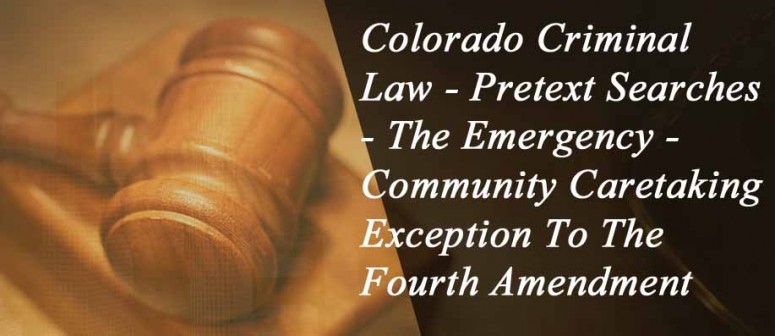
Other Articles of Interest:
- Colorado Criminal Law – When Police Violate Your Rights At A Traffic Stop
- Colorado Criminal Law Guide – Searches Of Your Car – Your Right To Refuse
- 2017 Colorado Case – Proves Once Again – Never Talk To The Police!
- Colorado Criminal Law – Am I Safe To Sit In My Car – Police Intrusion Issues
- Weaving Within My Lane In Colorado – 42-4-1007- Can They Stop Me For Suspected DUI?












